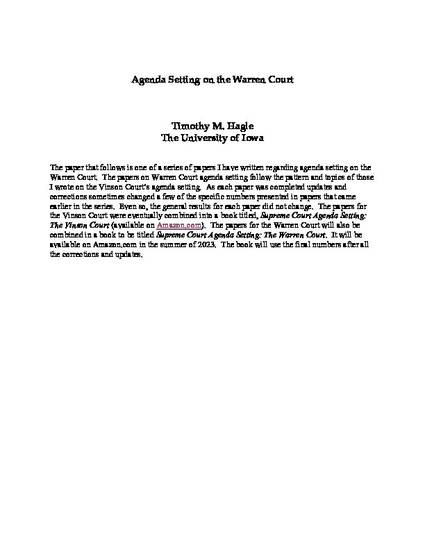
Unpublished Paper
Agenda Setting on the Warren Court Paper 3: Workload as a Factor
Agenda Setting on the Warren Court
(2022)
Abstract
Judicial scholars have long been interested in Supreme Court agenda setting. Political histories and biographies touch on the topic in relatively general terms and a long line of studies have examined factors related to why some petitions for writs of certiorari are granted review by the Court and others not. Because of the sheer number of certiorari petitions filed each term, most scholars sampled the data. Despite the many studies that have examined various aspects of the Court’s agenda setting, my focus here is on a specific aspect of the agenda setting process that has not yet been addressed in the literature. Although legal considerations are clearly important, the Court’s workload may affect the justices’ agenda setting as well. In this paper I assume that the justices are consistent in the approach they use to cope with their workload. Even so, it is the workload that tends to vary and this leads us to the central question of this study.
In this paper I examine all cases filed on the Warren Court’s appellate docket. Using charts to illustrate the data and difference of means tests to determine the significance of the results I find that that workload does seem to affect certain aspects of the Court’s agenda setting, particularly when appeals and petitions for certiorari are considered separately.
Keywords
- US Supreme Court,
- agenda setting,
- judicial politics,
- Warren Court
Disciplines
Publication Date
2022
Citation Information
Timothy M. Hagle. "Agenda Setting on the Warren Court Paper 3: Workload as a Factor" Agenda Setting on the Warren Court (2022) Available at: http://works.bepress.com/timothy_hagle/71/
